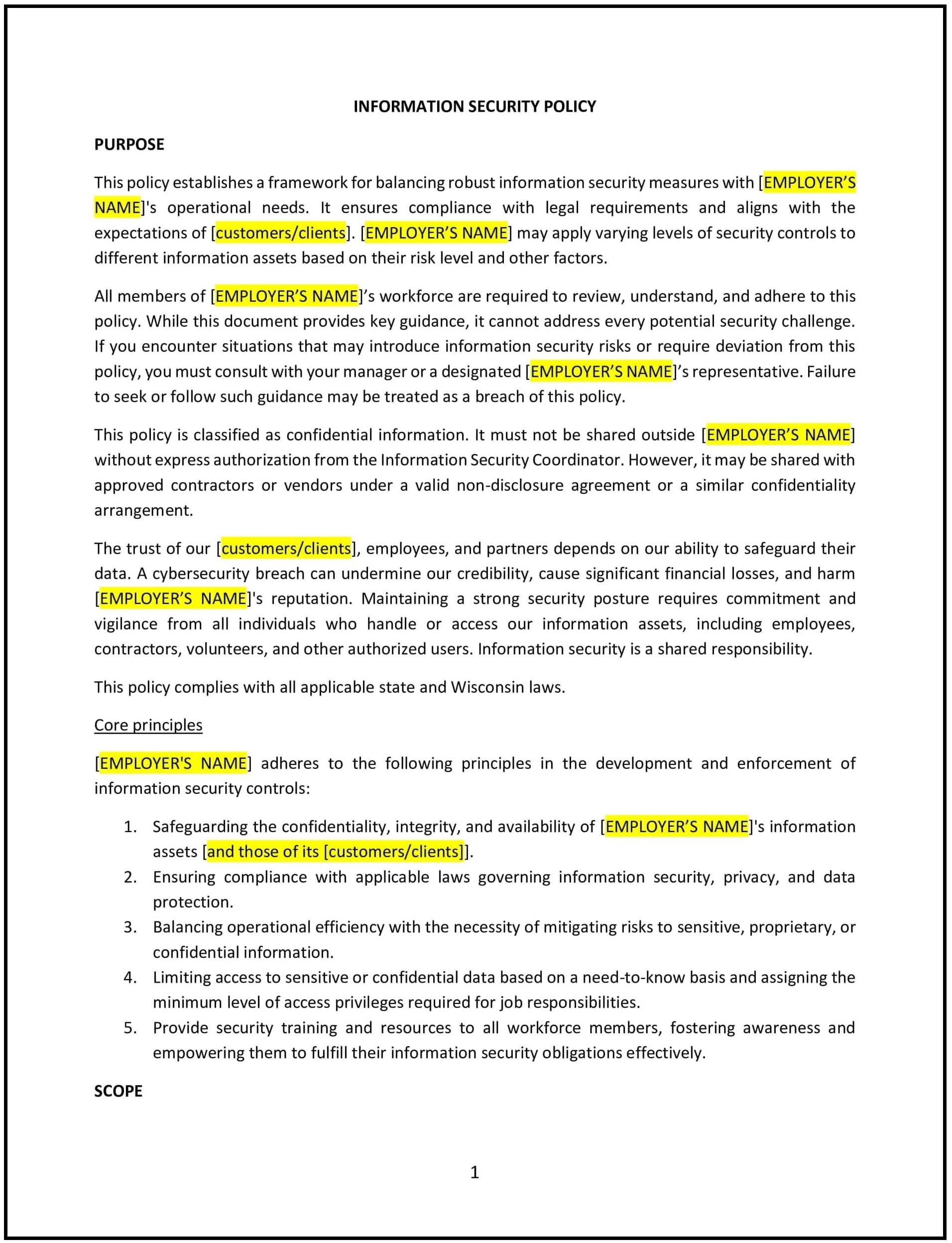Information security policy (Wisconsin): Free template
Got contracts to review? While you're here for policies, let Cobrief make contract review effortless—start your free review now.

Customize this template for free
Information security policy (Wisconsin)
An information security policy helps Wisconsin businesses protect their data, systems, and networks from unauthorized access, breaches, and other security threats. This policy outlines the company’s commitment to safeguarding sensitive information, achieving compliance with relevant data protection laws, and setting clear guidelines for securing business operations, both online and offline.
By implementing this policy, businesses can reduce the risk of data breaches, ensure the confidentiality and integrity of sensitive information, and build trust with clients, customers, and stakeholders.
How to use this information security policy (Wisconsin)
- Define sensitive information: Clearly define what constitutes sensitive information within the company, including personal data, financial data, intellectual property, and business secrets. Specify the types of data that need to be protected and the level of security required for each.
- Establish access control protocols: Implement access control measures to ensure that only authorized personnel can access sensitive information. Specify different levels of access based on employee roles and responsibilities, and ensure that access is granted on a need-to-know basis.
- Secure network and systems: Outline the procedures for securing company networks and systems, including firewalls, antivirus software, encryption, and other security technologies. Ensure that all systems are regularly updated and patched to address vulnerabilities.
- Set guidelines for password management: Establish rules for creating, storing, and managing passwords. This may include requirements for password complexity, expiration, and the use of multi-factor authentication (MFA) for accessing sensitive systems or data.
- Establish data protection measures: Specify the measures taken to protect data, such as data encryption, secure storage, and backup procedures. Define how data should be handled when transmitted, stored, or disposed of to prevent unauthorized access.
- Define employee responsibilities: Make it clear that all employees are responsible for safeguarding company information. This includes following security protocols, reporting potential threats or breaches, and avoiding risky behavior such as sharing login credentials or accessing sensitive data on unsecured devices.
- Outline breach notification procedures: Define the steps to take if a data breach occurs, including how breaches should be reported, the process for containing the breach, and how affected parties will be notified. Establish a response team and action plan to address security incidents swiftly.
- Enhance compliance with relevant laws: Ensure that the policy aligns with Wisconsin state laws and federal regulations governing data security, such as the General Data Protection Regulation (GDPR) if applicable, and the Health Insurance Portability and Accountability Act (HIPAA) for businesses handling medical information.
- Regularly review and update the policy: Periodically review the policy to ensure it remains aligned with emerging threats, new regulations, and technological advancements. Update the policy as necessary to address changing business needs and evolving security risks.
Benefits of using this information security policy (Wisconsin)
This policy offers several benefits for Wisconsin businesses:
- Protects sensitive data: The policy helps safeguard critical business and customer information, reducing the risk of data theft, breaches, and loss.
- Reduces legal and financial risks: By supporting compliance with data protection laws, the policy helps minimize the risk of costly fines, legal actions, and reputational damage resulting from security breaches.
- Builds customer trust: A commitment to information security reassures customers, clients, and stakeholders that their data is being handled securely, which can improve relationships and foster long-term loyalty.
- Enhances operational continuity: By proactively addressing security risks and incidents, the policy helps maintain business continuity, reducing disruptions caused by data breaches or cyberattacks.
- Strengthens company reputation: A strong information security policy demonstrates a company’s commitment to responsible business practices and data protection, which can enhance its reputation in the market.
- Provides a clear framework for employees: The policy provides employees with clear guidelines on how to handle sensitive information and respond to security threats, reducing the likelihood of accidental breaches or negligence.
Tips for using this information security policy (Wisconsin)
- Communicate the policy clearly: Ensure that all employees are aware of the information security policy and understand their responsibilities for protecting sensitive data. Provide training on data protection measures and how to identify potential security threats.
- Implement robust security technologies: Use advanced security tools and technologies, such as encryption, firewalls, and intrusion detection systems, to protect business data from unauthorized access or attacks.
- Regularly test and audit systems: Perform regular security audits, vulnerability assessments, and penetration testing to identify potential weaknesses in your network and systems.
- Ensure data access is controlled: Use role-based access controls to limit access to sensitive data based on job responsibilities. Regularly review access privileges and remove access for employees who no longer need it.
- Monitor and report security incidents: Implement continuous monitoring systems to detect unusual activity or potential security breaches. Establish a clear process for reporting and responding to incidents promptly.
- Backup data regularly: Ensure that all critical data is backed up regularly and stored securely. Implement disaster recovery protocols to restore data in the event of a breach, system failure, or cyberattack.
- Educate employees on security best practices: Regularly educate employees on the latest security threats, phishing attempts, and how to safeguard sensitive information both on and off the job. Encourage safe practices such as locking devices when not in use and using strong passwords.